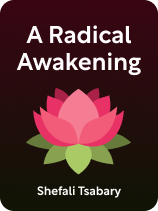

This article is an excerpt from the Shortform book guide to "A Radical Awakening" by Shefali Tsabary. Shortform has the world's best summaries and analyses of books you should be reading.
Like this article? Sign up for a free trial here.
Why do women feel pressured to conform to society’s expectations? What happens when we question long-held beliefs about gender roles?
Many myths about women have been passed down through generations, shaping everything from sexuality and relationships to motherhood and beauty standards. These inherited beliefs often limit women’s choices and authentic expression, yet they persist mainly because we’ve stopped questioning them.
Keep reading to explore Dr. Shefali Tsabary’s ideas on how breaking free from these constraints can lead to more fulfilling lives and stronger relationships.
Societal Myths About Women
Tsabary explains that an important part of connecting with and acting according to your authentic self is learning to deconstruct societal myths about women. She explains that the patriarchy has a set of rules and standards that tell us how we should act and how things should be, but that most of these rules and standards are baseless—they’re simply opinions that have been accepted as truth for so long that we no longer question them.
(Shortform note: That we live in a patriarchal society based on inherited beliefs and systems is accepted knowledge; however, the patriarchy didn’t always exist. According to anthropologists, remains found at the 9,000-year-old site of Çatalhöyük in modern-day Turkey suggest that men and women lived fairly equal lives—they ate the same food and did the same work. The first records of a patriarchal society come from ancient Mesopotamia around 5,000 years ago: Anthropologists theorize that the patriarchy here arose out of a need for resources—resources like food and armies are provided by people, and women produce people. Therefore, women’s primary role began to center around producing and raising children.)
Tsabary says that, instead of living according to these myths, women need to question their accuracy and live by what they think and feel to be right. We’ll outline four areas where following societal myths tends to disadvantage women. (Tsabary notes that many of the following discussions pertain to cisgender women and heterosexual relationships.)
Sexuality Myths
Tsabary explains that societal myths tell women that connecting to and expressing their sexuality is inappropriate and shameful. They’re taught that sex is something that should happen only in wedlock with the intent of conception. However, denying women the ability to explore their sexuality—independently and with partners—takes power and pleasure away from them and gives it to men. If women aren’t allowed to explore themselves, they’re unable to experience pleasure without a man and are never given the opportunity to understand their own wants and needs. On the other hand, society says it’s OK for men to explore their sexuality alone and with others outside of wedlock.
Tsabary says that women should reclaim their sexuality by exploring their own bodies and sexual interests. They should shamelessly decide who they want to have sex with, when, and how often.
Relationship Myths
According to Tsabary, the notions that society preaches about monogamy and the nature of relationships contradict human nature.
Our Non-Monogamous Nature
First, Tsabary believes that human nature is tailored toward non-monogamy rather than monogamy, as society preaches. Tsabary claims that the different biopsychologies of men and women support this claim—men are fertile all the time and can impregnate infinite women; therefore, their nature is to constantly seek partners to spread their genes. On the other hand, women are fertile only once a month and can produce a limited number of children, therefore they must be highly selective in their partner to ensure strong offspring—but each child doesn’t need to have the same father.
Further, says Tsabary, human tribal history shows that most communities were non-monogamous and that children were raised by the community rather than a mother-father unit. This allowed children to receive constant attention and care without a nuclear family. This community structure supported non-monogamy because it allowed adults to have relationships and children with multiple partners without negatively impacting child rearing and development.
Ultimately, our biopsychology and history show that humans thrived in non-monogamous communities.
The Detriments of Monogamy
While Tsabary recognizes that non-monogamy isn’t for everyone, she emphasizes that simply accepting the standards of monogamy without introspection can cause major problems.
First, committing to one person for the rest of your life without question often causes both men and women to sabotage their happiness and fulfillment. Tsabary believes that it’s highly unlikely for one person to fulfill all your mental, emotional, and sexual needs for the rest of your life. Therefore, monogamy often causes people to suffer with unfulfilled needs by denying them the opportunity to connect with people who can meet those needs.
Meeting these needs is important, explains Tsabary, because they’ll lead to a point of breakdown if they go unmet for long enough. For example, we may begin to resent our partner who’s unable to provide the emotional support we need. Or, we deceive our partner by fulfilling sexual needs they don’t meet outside the relationship without their consent. Whether we want to or not, our subconscious mind will drive us to meet our needs—it’s better to do so in a healthy way than in unsatisfactory ways.
This isn’t to say you need to leave your primary partnership to satisfy your needs—Tsabary believes you can explore other connections while maintaining a loving relationship with your primary partner. This is possible because, according to Tsabary, love and commitment are about much more than sex—they’re about regular connection and shared experiences. If partners are committed to dedicating time to each other and growing together, and agree on being non-monogamous, they can continue a happy partnership while meeting unfulfilled needs outside the relationship.
Marriage Myths
Tsabary continues to explain that our beliefs surrounding marriage can also cause major turmoil. We’re taught that once the marriage contract is made, it should never be broken. This causes many women to endure unhappy and even abusive marriages due to the stigma they fear facing upon divorce.
Further, Tsabary says that while we’re taught that marriage is the ultimate guarantee of love, love comes from partners’ commitment to constantly grow together. People think that once they get married, their relationship is set in stone and will never change. Tsabary explains that this is unrealistic because people are constantly changing—if you cling to a past state of your partner or relationship, you create distance that can be irreconcilable.
Tsabary says that true love and commitment require you to accept the evolving nature of your partner and relationship, and commit to growing alongside them. Part of committing to this growth is realizing when two people also naturally grow apart—if this happens, a marriage contract can’t preserve love. Instead, partners who are no longer compatible must acknowledge this and release each other so they can continue to grow on their own paths and reach their individual potentials.
Motherhood Myths
Tsabary explains that the societal expectations around motherhood often influence women’s identities negatively. First, society often tells women that the most important thing they can do in life is become a mother, and that if they don’t have children, they’re less of a woman. This is inherently untrue and often makes women without kids or who are unable to conceive feel they’ve lost their female identity.
Further, society encourages motherhood to consume women’s identities once they have children. Because their identity and sense of self-worth become dependent on their children, women become obsessed with being the “perfect” mom. This often causes mothers to put too much pressure on their kids to be perfect—smart, athletic, polite, and so on—because they see their kids as a representation of themselves. Further, when children grow up and move out, the mother often feels she’s lost her identity because she no longer has a child to obsess over.
Instead, Tsabary says mothers should see their child as a separate entity that they love and support. They should live in the present moment and accept things as they are rather than judging them as good or bad—not let their children’s behavior or emotions affect their own, and not judge their kids as being good enough or not. This allows them to be a stable and consistent supporter for their children. They should also work to heal their own issues so they can be the best parent they can be.
Appearance Myths
Tsabary adds that women also feel constant pressure to meet society’s strict beauty standards—to be young and skinny with light skin, hair, and eyes. However, these standards are unrealistic for most women—especially for those of non-European descent. Despite this, women are made to feel ugly and unworthy when they don’t meet these standards—for example, when they age or gain weight. These feelings of unworthiness often drive them to dress up, dye their hair, pile on makeup, or even undergo procedures and surgeries to alter their appearance.
However, Tsabary notes that when women attempt to improve their appearance, they make matters worse for women as a whole. The more women adhere to beauty standards and change themselves to meet them, the more they strengthen these standards and the belief that looking different makes them unworthy.
Instead, Tsabary proposes that we resist altering ourselves to meet standards—for example, wear your natural hair, don’t alter your appearance with heavy makeup or surgery, and dress in comfortable clothes rather than clothing meant to boost your attractiveness. Further, stop using words like beautiful or perfect to describe appearances—doing so implies that alternative appearances are ugly or flawed. Instead, simply accept and label your body as it is. For example, rather than saying “my curves are beautiful,” say “I love my curves.”

———End of Preview———
Like what you just read? Read the rest of the world's best book summary and analysis of Shefali Tsabary's "A Radical Awakening" at Shortform.
Here's what you'll find in our full A Radical Awakening summary:
- The patriarchy’s impact on women’s sense of identity
- The destructive societal myths that dictate women’s lives
- How women can break the patriarchal cycle they were raised in






